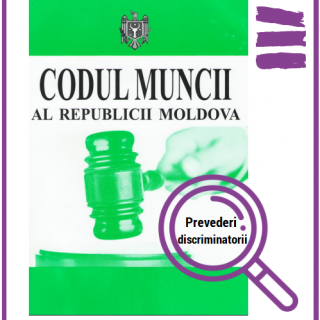Although the Ministry of Health, Labour and Social Protection proposes to amend the Labour code, the discriminatory provisions have not been eliminated!
On August 16, 2019 the Ministry of Health, Labour and Social Protection (MHLSP), through public consultations, presented the project, enacted by the Government with the passage of the bill on applying changes to the Labour code of the Republic of Moldova № 154/2003.
The Council for Preventing and Eliminating Discrimination and Ensuring Equality points out the fact that for several years it has submitted a number of recommendations to the Ministry to apply certain changes to some discriminatory provisions of the Labour code. Another Advisory letter with the suggestions of the Council on applying changes was sent on August 6.
All the suggestions provided by the Council on eliminating discriminatory provisions were not implemented in the draft law on amendments to the Labour code. This means that contradicting non-discriminatory standards will lead to the further keeping the provisions that will discriminate people due to sex, gender, retirement status, disability, nationality, etc.
The suggestions of the Council on amending the Labour code are presented through the following aspects:
* Introduction of definitions of ” payment “, “equal work”, ” work of equal value”
The jurisprudence of the Council points out that there are problems in applying the notions of equal pay for equal work or for work of equal value. It happens due to the fact that the national legislation does not define the concepts of “payment”, “equal work “, ” work of equal value”, which creates difficulties in comparing certain positions or professions to establish salaries. In this regard, the Council suggested to introduce these definitions into the content of article 1 of the Labour code. This suggestion was not taken into consideration in the draft amendments.
* Provision of protective guarantees, regardless of sex of the person
In 2015, the Council investigating the case № 1. 298/15, found that the legislator divides workers according to gender criterion in the provision of protective guarantees. Therefore, an interdiction was imposed on the dismissal of only women who have children under 6 years, not men in a similar situation. In order to eliminate the discriminatory situation, the Council sent a recommendation to the Ministry of Health, Labour and Social Protection to amend the content of article 251 of the Labour code by changing the text “women who have children under the age of 6” to “persons who have children under the age of 6”. Following the changes made at that time, the Council noticed only the replacement of the Syntagma “6 years” by “4 years”, while the discriminatory provision remained. The Council drew an inference to the Ministry, insisting on making the necessary changes, however, the suggestion was ignored.
* Addition of the article 86 (1) b. y1)
In 2018, the Council found an increase from 10% to 31% of cases of discrimination in world of work. One of the reasons for the significant increase is the selective enforcement by employers of the requirements of article 86 part (1) b. y1) of the Labor code on the dismissal of an employee with the status of an old-age pensioner. The Council offered the Ministry of Health, Labour and Social Protection to amend article 86 part (1) b. (y1)in the the Labour code, taking into account the relevant jurisprudence of the Court of Justice of the European Union, which states that the application of these provisions must follow an objective and reasonable justification corresponding to the purpose pursued, and the actions taken must be necessary and adequate. Thus, it was suggested that the article 86 (1) (b) (y1) with the text:”is applied only for the purpose of hiring young people, according to the assessment of professional qualities” should be changed. Accordingly, this change will not affect the right of young people to be employed, but at the same time will provide protection to employed pensioners.
* Application of probation to persons with disabilities
Labour code, in accordance with article 62. b. f). excludes the application of probation to persons with disabilities. In order to ensure equality in the world of work of all persons, the Council suggested to repeal this provision, as the probationary period is necessary for testing the knowledge and skills of the employee, as well as for his adaptation on the workplace. By ratifying the UN Convention on people with disabilities, the Republic of Moldova assumed the obligation to recognize their rights as equal with others.
* Execution of employment contract for an indefinite period with foreigners who have the right of temporary stay to restore the family, as well as with foreigners who have the right of permanent residence
The Council suggested to amend article 55 (1) (b) (c1) in order to avoid nationality-based discrimination in the employment of foreigners with the right of temporary stay to restore the family, as well as foreigners with the right of permanent residence. Thus, the Council suggests amending b. c1) part (1) of article 55 of the Labour code as follows: “c1 ) with immigrant workers;”.
After consulting the draft law on amendments to the Labour code of the Republic of Moldova № 154/2003, the Council noticed that none of the suggestions submitted had been taken into account, which, in the future, threatened to lead to intentional discrimination against persons.
The recommendations of the Council can be found here.
